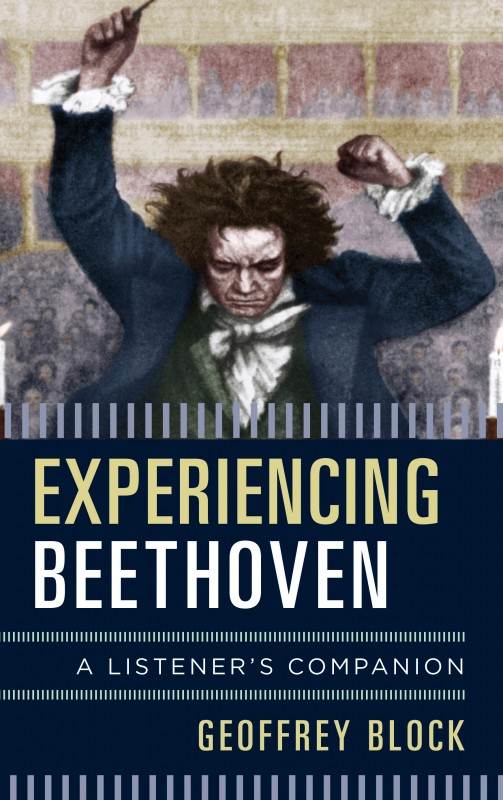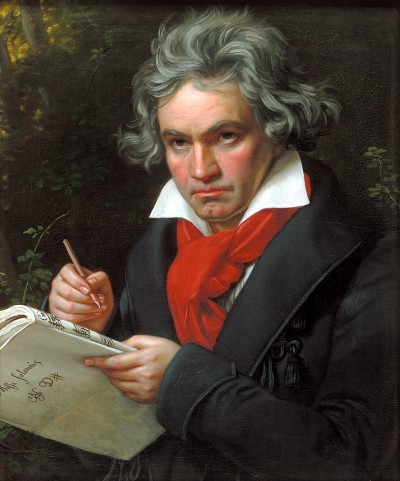The Listener’s Companion series book is for all audiences; Explore the genius of Beethoven through his music
TACOMA, Wash. – Geoffrey Block, a celebrated author of books on American musicals and composers, had no plans to write a book about Beethoven, arguably the public’s most adored composer of classical music.
After all, thousands of volumes had been written on the man, so “Why Beethoven?”
When his publisher, aware that Block had written his Harvard dissertation on Beethoven years earlier, offered the possibility of undertaking such a work, Block was tantalized.
The question had to be asked: What is this “magic ingredient” that makes the unkempt, afflicted genius of composition as appealing today as two centuries ago? Indeed, why was Beethoven’s Ninth Symphony chosen to carry the story in the movies A Clockwork Orange and Die Hard? Why does the Peanuts’ character, Schroeder, play only Beethoven on his toy piano in more than 250 comic strips? And why is Beethoven’s Ode to Joy performed at the end of every Olympic Games, a tradition that has stood since 1956?
In his new book, Experiencing Beethoven: A Listener’s Companion (Rowman & Littlefield, October 2016), Block answers the question his way:
“Despite his fiction-worthy biography, iconic scowl, and the powerful image of a man raging and shaking his fist against a stormy face on his deathbed, I am convinced that the answer to “Why Beethoven?” is to be discovered in his music,” Block wrote in the book’s introduction.
With that, Block takes the reader along for what he describes as “a guided tour of the music created by this ‘unlicked bear’”—a sobriquet given to Beethoven by Italian composer Luigi. Cherubini, who saw his rival as “unpolished and crude.”
Block’s 270-plus page book uses language and stories aimed as much at the musical layman as at long-standing fans. It is a story about the creation of great music, told by a talented and conversant author, in the context of the composer’s personal and professional life and the cultural milieu of the time.
Experiencing Beethoven devotes three chapters to single works (Fidelio, Ninth Symphony, and String Quartet No. 14 in c-sharp minor). Several more chapters cover other symphonies (First, Eroica, Fifth, Pastoral, Seventh, and Eighth), eight piano sonatas written over the course of his career (including Pathétique, Moonlight, Tempest, Appassionata, and two late sonatas), and string quartets from every period. The volume covers history’s first important song cycle, An die Ferne Geliebte (To the Distant Beloved), as well as other songs and the piano bagatelle Für Elise. Block also introduces the reader to some fascinating but lesser-known works (Joseph Cantata, Wellington’s Victory, Diabelli Variations).
However, not for a moment does Block pretend that Beethoven’s music alone endowed him with his godlike status among composers.
“[Beethoven] also profits from his compelling backstory, the story of a driven creator who managed to transform a composer’s greatest nightmare, the emotional suffering brought about by the affliction and shame of deafness, into music that is full, not only of anger and pain, but joy, or to use the word Beethoven used at the beginning of the Ninth Symphony’s finale, Freudenvollere (joyfulness),” Block wrote.
Acknowledging this, the author transports readers to historic concerts, including Fidelio’s unfortunate debut in 1805, several days after France’s Napoleon had invaded Vienna, leaving the theater almost empty. The private and unofficial Vienna debut of the String Quartet No. 14 in c-sharp minor, performed in 1828 for Franz Schubert, who was on his deathbed.
Stories from Beethoven’s life are told with help from the scholars who studied the near 2,000 letters that the composer wrote throughout his lifetime, the 171 entries in his diary from 1812 to 1818, the 50 musical sketchbooks, and the 113 conversation books that were Beethoven’s means of communicating as his deafness progressed. One significant letter, Block writes, reveals how Beethoven suffered from his deafness and how he vowed to conquer the affliction and live for art. Another may have been sent to the unnamed woman he loved, known only as of the Immortal Beloved—a woman who was ready to leave her husband and children for the unruly musician.
Beethoven readily broke the rules in his music composition, and the often breathtaking result posed a challenge to his contemporaries. Yet, during his lifetime, he became the most acclaimed composer of the era. Experiencing Beethoven takes the reader directly into the composer’s personal world and deep into the music that was the world he cherished above all else. Block sums up Beethoven’s incredible gift to us at the end of his introduction to the book:
“Like his fictional contemporary, Goethe’s Faust, Beethoven was a kind of musical alchemist who, in the course of remarkably varied works, converted suffering into joy, a joy that is ours to savor, nourish, and treasure.”
Book Orders are currently eligible for a 25% discount off the list price (hardback and ebook). Please order using this code: 7A3AUTHF from https://rowman.com/ISBN/9781442245457.
Geoffrey Block is a distinguished professor of music history at the University of Puget Sound. He is the author of Ives: “Concord” Sonata (1996); Enchanted Evenings: The Broadway Musical from “Show Boat” to Sondheim and Lloyd Webber (1997, 2nd ed. 2009); and Richard Rodgers (2003). He was co-editor and contributor to Charles Ives and the Classical Tradition (1996); and the editor of The Richard Rodgers Reader (2002) and two series of books on the American musical (Yale Broadway Masters and Oxford’s Broadway Legacies).
Press photos of Geoffrey Block and the book cover can be downloaded from pugetsound.edu/pressphotos
Photos on page: From the top right: Book cover; Beethoven, painting by Joseph Karl Stieler, 1819 or 1820; Geoffrey Block, by Ross Mulhausen
Tweet this: Why? A #newbook, Experiencing #Beethoven, by Geoffrey Block @univpugetsound. Cause to know his music is to know his genius http://bit.ly/2d0AtYd.
Follow us on Twitter! twitter.com/univpugetsound


